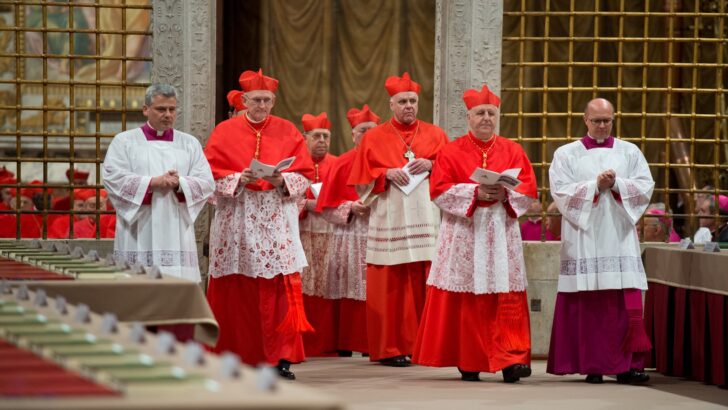135 cardinals are eligible to vote, but not all of them will attend the conclave. Nevertheless, there is a record. Before the papal election, various topics are now on the table – and those affected by abuse are voicing criticism.
Preparations for the biggest papal election of all time are in full swing in the Vatican. 135 cardinals, i.e. all those under the age of 80, will be eligible to vote when the conclave begins on 7 May. Of these, only those who have cancelled their vote with a medical certificate will not be able to vote. According to the Vatican press office, two cardinals have done so so far, meaning that 133 are expected to take part in the election. Three German cardinals are eligible to vote: Reinhard Marx (71), Gerhard Ludwig Müller (77) and Rainer Maria Woelki (68).
In an interview with the Catholic News Agency (KNA) on Wednesday, the Archbishop of Cologne said that the future issues for the Church were on the table: Proclamation of faith and secularisation, wars, technological progress and endangered democracies. So far, he does not have a specific candidate in mind, at most three or four men who could be suitable for the papacy, said Woelki. As a cardinal in the conclave, he does not represent the Church in Cologne or Germany: “As a bishop, I am above all bound by my conscience in this spiritual process.”
Tensions in the Church
One week before the papal election began, the cardinals in Rome spoke explicitly about tensions in the Church. They described the polarisation in the Church and society as an open “wound”, Vatican spokesman Matteo Bruni reported on the speeches made by the College of Cardinals at the so-called pre-conclave.
During Francis’ term of office (2013-2025), there have repeatedly been unusually sharp conflicts within the Church as a result of the Pope’s controversial decisions and a change in the culture of debate. Conservative and traditionalist circles in particular have complained about this in recent years.
Meanwhile, those affected by abuse have criticised the presence of some cardinals who have been charged with criminal proceedings at the current pre-conclave in the Vatican. Matthias Katsch, spokesman for the “Square Table” initiative, called for transparent and globally standardised procedures and regulations for dealing with clerical abusers and cover-ups, which must also be applied safely after the death of a pope.
Difficult financial situation
The cardinals gathered in Rome on Wednesday also discussed the Vatican’s difficult financial situation. Cardinal Marx, coordinator of the Holy See’s Economic Council, was the first to comment on this, according to Vatican spokesperson Bruni. The Archbishop of Munich emphasised the issue of “financial sustainability”, which is necessary to ensure the Vatican’s service to the universal Church. In addition to challenges, Marx also mentioned proposed solutions.
In his last year in office, Pope Francis repeatedly emphasised the Vatican’s dramatic deficit. In September 2024, he called on the cardinals to be more frugal and come up with new financing ideas in an urgent letter. From his sickbed on 26 February, he ordered the establishment of a new commission to focus more on fundraising for the Vatican.


 Cardinals enter the Sistine Chapel at the Vatican March 12, 2013, to elect a successor to Pope Benedict XVI. Pictured are: U.S. Cardinal James M. Harvey, archpriest of the Basilica of St. Paul Outside the Walls, left; U.S. Cardinal Edwin F. O'Brien, center; and Italian Cardinal Giuseppe Versaldi, right. (CNS photo/Vatican Media)
Cardinals enter the Sistine Chapel at the Vatican March 12, 2013, to elect a successor to Pope Benedict XVI. Pictured are: U.S. Cardinal James M. Harvey, archpriest of the Basilica of St. Paul Outside the Walls, left; U.S. Cardinal Edwin F. O'Brien, center; and Italian Cardinal Giuseppe Versaldi, right. (CNS photo/Vatican Media) 